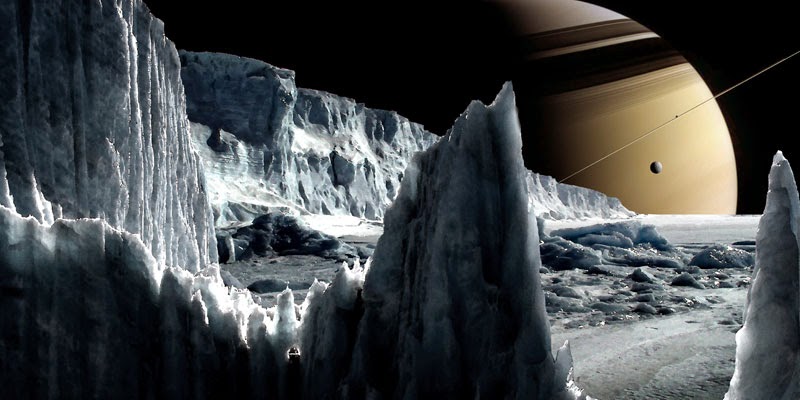Enceladus
In astronomy news this week it was announced that Enceladus, which sounds like an item on the menu at Taco Bell, but is actually a moon of Saturn, has a body of liquid water, an ocean under its icy crust. At one time, it was thought that Earth was the only object in the solar system that had liquid water. Why is this important? Because water is the key ingredient in life.
Frankly, I had never heard of Enceladus before. At first I thought it was a newly discovered moon; it has 62, so far. But no, this one was discovered by William Herschel in 1789. It just hasn't gotten as much press as Titan or Hyperion. It is only 500 kilometers in diameter--one seventh the size of Earth's moon, but the sixth-largest of Saturn's moons. The Cassini spacecraft observed in 2005 that it shoots plumes of water out of its poles, which then led to the discovery that the source of the plumes was an ocean, thereby exciting scientists who think that this could be the most ideal place for extraterrestrial life.
But beyond that, I love hearing about places like this. I'm not a big sci-fi geek, but imagining outposts like this one fire up the imagination. If every moon, asteroid and the like could be inhabited, it would be so cool, the way we think of exotic countries now. I mean, we don't know much about Turkmenistan, but we know there are people there. What if all of space were like this, each one having its own character? The old Lost in Space TV show simplified this, as there was the planet of hippies, the one where vegetables could talk, etc.
Learning about Enceladus also compelled me to learn about the name. Enceladus is a name from Greek myth (at first, the planets were named for Roman gods, their moons for Greek gods, but this has been fudged over time). He was a giant, or Gigante, one of the children of Gaia, fertilized by the blood of a castrated Uranus (these Greek myths sure are lurid). The first discovered moons of Saturn were named after the Titans, who were children of Uranus and Gaia, but Enceladus doesn't seem to be technically a Titan.
Anyhoo, like other Gigantes, he had serpent-like lower limbs and dragon-like feet. He was killed in the battle of Olympians by a spear thrown by Athena and buried in Sicily. That he had a moon named after him is probably his most lasting legacy.
But think, think! of what it would mean if some microbe were discovered to be swimming around in Enceladus' frigid water! Then Enceladus would be a name on everyone's lips.
Frankly, I had never heard of Enceladus before. At first I thought it was a newly discovered moon; it has 62, so far. But no, this one was discovered by William Herschel in 1789. It just hasn't gotten as much press as Titan or Hyperion. It is only 500 kilometers in diameter--one seventh the size of Earth's moon, but the sixth-largest of Saturn's moons. The Cassini spacecraft observed in 2005 that it shoots plumes of water out of its poles, which then led to the discovery that the source of the plumes was an ocean, thereby exciting scientists who think that this could be the most ideal place for extraterrestrial life.
But beyond that, I love hearing about places like this. I'm not a big sci-fi geek, but imagining outposts like this one fire up the imagination. If every moon, asteroid and the like could be inhabited, it would be so cool, the way we think of exotic countries now. I mean, we don't know much about Turkmenistan, but we know there are people there. What if all of space were like this, each one having its own character? The old Lost in Space TV show simplified this, as there was the planet of hippies, the one where vegetables could talk, etc.
Learning about Enceladus also compelled me to learn about the name. Enceladus is a name from Greek myth (at first, the planets were named for Roman gods, their moons for Greek gods, but this has been fudged over time). He was a giant, or Gigante, one of the children of Gaia, fertilized by the blood of a castrated Uranus (these Greek myths sure are lurid). The first discovered moons of Saturn were named after the Titans, who were children of Uranus and Gaia, but Enceladus doesn't seem to be technically a Titan.
Anyhoo, like other Gigantes, he had serpent-like lower limbs and dragon-like feet. He was killed in the battle of Olympians by a spear thrown by Athena and buried in Sicily. That he had a moon named after him is probably his most lasting legacy.
But think, think! of what it would mean if some microbe were discovered to be swimming around in Enceladus' frigid water! Then Enceladus would be a name on everyone's lips.



Comments
Post a Comment